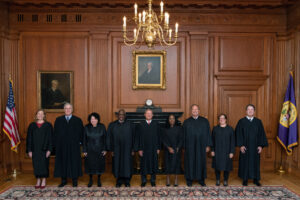
(Photo by Collection of the Supreme Court of the United States via Getty Images)
I’ve never liked when people refer to American slavery as a “peculiar institution.” There are words that are far more apt — “brutal,” “unhallowed”; I’d even accept the formality that “foundational” confers.
But peculiar? That’s an adjective better used for describing casserole at a potluck that tastes just a little off, not 400 years of terror, thingification, rape, and so, so much jurisprudence on contracts, wills, and penal codes. Part of the admitted peculiarity is that, despite how foundational it is to the country, it isn’t really talked about. Sure there’s the expected lip service and dashiki wearing from members of Congress from time to time, but it is difficult to see, concretely, the legacy of enslavement and how often the families that owned people have maintained positions of authority down the line. For example, did you know that the ancestors of two current Supreme Court justices owned slaves?

Pursuing The Pro Bono Story: A Conversation With Alicia Aiken
This Pro Bono Week, get inspired to give back with PLI’s Pursuing Justice: The Pro Bono Files, a one-of-a-kind podcast hosted by Alicia Aiken.
From Reuters:
In researching the genealogies of America’s political elite, a Reuters examination found that a fifth of the nation’s congressmen, living presidents, Supreme Court justices and governors are direct descendants of ancestors who enslaved Black people…Two of the nine sitting U.S. Supreme Court justices – Amy Coney Barrett and Neil Gorsuch – also have direct ancestors who enslaved people.
It is hard to read this and not immediately think of Justice Jackson’s point about how denying affirmative action while still allowing for legacy admissions could in itself be an equal protection violation:
Justice Ketanji Brown Jackson confronted the lawyer arguing for outlawing affirmative action with how his proposed college admissions system would privilege a white legacy applicant over a Black descendent of slaves. Listen here –> pic.twitter.com/YYUczNakM8
— Demand Justice (@WeDemandJustice) October 31, 2022

Why Your Practice Is Burning Money And How You Can Do Better
Our expert panel explores common sources of profit leakage along with practical steps for improvement.
It is also helpful to think about race and familial heritage when it comes to each judge’s impartiality. It was understandable that when the Harvard affirmative action case came up that people expected Jackson’s recusal because she was a member of Harvard’s Board of Overseers for six terms. The dumber argument — and there were times where it was difficult to know which one had more airtime — was that she should recuse herself from any case involving affirmative action because she, as a black woman, would be too biased to approach the matter objectively. I didn’t see many people using the same argument that since Clarence Thomas is a black male that he shouldn’t sit on those cases either, but that’s neither here nor there. He has a history of not giving a damn about judicial ethics either way.
Digging around the justices’ family trees is an opportunity to question the impartiality taken for granted with Justices Barrett and Gorsuch. For example, in light of their family histories, aren’t Barrett and Gorsuch enmeshed historically in the legacy of racism? Are they able to impartially rule on cases that can implicate the afterlife of America’s brutal institution — Fourteenth Amendment cases, racial gerrymandering, and, obbiously, affirmative action — and impact the social standing of families like theirs? Just think about the backlash from Ben Affleck’s embarrassment in finding out that some of his old money had a bit of blood on it.
The study showed that learning about the family histories of enslavement could change important political stances like who they would be willing to vote for or if they were in support of reparations. Attentiveness to the legacies of our Supreme Court justices could also impact what they say… and how we hear their judgments.
More Than 100 U.S. Political Leaders Have Ancestors Who Were Slaveholders [Reuters]
 Chris Williams became a social media manager and assistant editor for Above the Law in June 2021. Prior to joining the staff, he moonlighted as a minor Memelord™ in the Facebook group Law School Memes for Edgy T14s. He endured Missouri long enough to graduate from Washington University in St. Louis School of Law. He is a former boatbuilder who cannot swim, a published author on critical race theory, philosophy, and humor, and has a love for cycling that occasionally annoys his peers. You can reach him by email at [email protected] and by tweet at @WritesForRent.
Chris Williams became a social media manager and assistant editor for Above the Law in June 2021. Prior to joining the staff, he moonlighted as a minor Memelord™ in the Facebook group Law School Memes for Edgy T14s. He endured Missouri long enough to graduate from Washington University in St. Louis School of Law. He is a former boatbuilder who cannot swim, a published author on critical race theory, philosophy, and humor, and has a love for cycling that occasionally annoys his peers. You can reach him by email at [email protected] and by tweet at @WritesForRent.